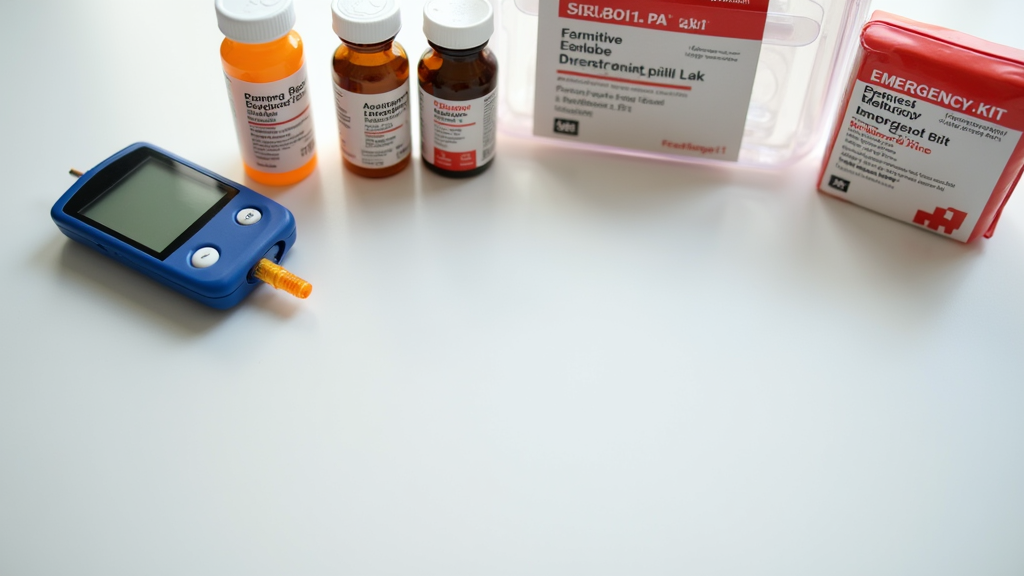Introduction
Getting diagnosed with diabetes can be overwhelming. You might have many questions and concerns, but it’s important to know you’re not alone. With the right plan, resources, and mindset, managing diabetes is entirely possible. This guide, as well as this website, will walk you through everything you need to know and do after you are just diagnosed with diabetes.

Table of Contents
Understanding Your Diabetes Diagnosis
Types of Diabetes: Type 1, Type 2, and Gestational
There are three main types of diabetes, each with its unique characteristics:
- Type 1 Diabetes: Typically diagnosed in childhood or adolescence, this autoimmune condition causes the pancreas to stop producing insulin. People with Type 1 need insulin therapy to manage their condition.
- Type 2 Diabetes: The most common form, Type 2, occurs when the body either resists the effects of insulin or doesn’t produce enough insulin to maintain normal blood sugar levels. It is often linked to lifestyle factors but can also have a genetic component.
- Gestational Diabetes: This type occurs during pregnancy and typically goes away after giving birth. However, having gestational diabetes increases your risk of developing Type 2 diabetes later in life.
What It Means to Be Diagnosed with Diabetes
Being diagnosed with diabetes means your body struggles to regulate blood sugar levels. This condition can lead to serious health problems if unmanaged. However, with proper treatment, lifestyle changes, and monitoring, many people live full, active lives with diabetes.
Common Misconceptions and Myths About Diabetes
There are many myths surrounding diabetes, such as:
- “Only overweight people get diabetes” – False. While being overweight can increase the risk, thin people can also develop diabetes.
- “Eating too much sugar causes diabetes” – False. While excessive sugar consumption may contribute to obesity and insulin resistance, it doesn’t directly cause diabetes.
Immediate Steps to Take After Diagnosis
Scheduling a Follow-up with a Healthcare Provider
After your diagnosis, the first step is scheduling an appointment with your healthcare provider. This visit will help you understand your condition better, discuss treatment options, and create a diabetes management plan.
How to Inform and Involve Your Family and Close Friends
It’s important to involve your family and friends in your diabetes journey. Their support can make a significant difference in managing your condition. Educate them on what diabetes is, how it affects your daily life, and what they can do to help.
Necessary Lifestyle Adjustments
Diabetes often requires changes in your daily routine. These changes might include:
- Modifying your diet
- Increasing physical activity
- Learning to monitor blood sugar levels
Building Your Healthcare Team
Key Healthcare Professionals for Diabetes Management
Your healthcare team should include various professionals to help manage your condition:
- Primary care physician: Oversees your overall health and diabetes management.
- Endocrinologist: A specialist in diabetes care.
- Certified Diabetes Educator (CDE): Provides education on managing your condition.
- Dietitian/Nutritionist: Helps create a diabetes-friendly meal plan.
Importance of Regular Checkups and Monitoring
Regular checkups are crucial to track your progress and adjust your treatment plan as necessary. These visits help prevent complications such as heart disease, kidney problems, or vision issues.
Role of Support Groups and Diabetes Education Programs
Support groups and education programs offer a space to share experiences, learn new strategies, and stay motivated. Connecting with others who have diabetes can make the journey less isolating and provide valuable insights.
Diet and Nutrition: Making Smarter Choices
Understanding the Role of Carbohydrates, Proteins, and Fats
Carbohydrates, proteins, and fats all affect blood sugar differently. Learning how to balance these macronutrients is key to maintaining stable glucose levels. Carbohydrates, in particular, can cause spikes, so portion control and smart choices are essential.
Creating a Balanced Meal Plan
Your meal plan should include a variety of nutrient-dense foods, such as:
- Whole grains
- Lean proteins
- Healthy fats
- Plenty of vegetables and fiber-rich foods
Tips for Dining Out and Special Occasions
Eating out doesn’t mean you have to abandon your plan. When dining out:
- Choose dishes with whole grains, lean proteins, and vegetables.
- Ask for dressings and sauces on the side.
- Watch portion sizes and avoid fried or sugary foods.
Exercise: Incorporating Physical Activity into Your Routine
Types of Exercises Beneficial for Diabetes
Exercise helps control blood sugar, maintain a healthy weight, and improve overall well-being. Beneficial activities include:
- Aerobic exercises (walking, swimming, cycling)
- Strength training (weight lifting, resistance bands)
- Flexibility and balance exercises (yoga, Pilates)
Creating a Sustainable Exercise Routine
Start slow and set realistic goals. Aim for at least 150 minutes of moderate-intensity exercise per week. Find activities you enjoy to make it easier to stick with the routine long-term.
Monitoring Blood Sugar Levels During and After Exercise
Check your blood sugar before, during, and after exercise to understand how physical activity affects your levels. Adjust your food intake or insulin dosage as needed.
Medication and Treatment Options
Overview of Insulin Therapy and Oral Medications
Insulin therapy is necessary for people with Type 1 diabetes and may also be prescribed for some with Type 2. Oral medications, such as metformin, can help people with Type 2 manage their blood sugar levels by improving the body’s insulin response.
Understanding Possible Side Effects and Managing Them
Medications can have side effects like low blood sugar (hypoglycemia), nausea, or weight gain. It’s important to communicate with your healthcare provider to adjust your treatment plan if necessary.
Exploring Alternative and Complementary Therapies
Some people explore alternative therapies such as acupuncture, supplements, or herbal treatments. Always consult with your healthcare team before trying any new therapies to ensure they don’t interfere with your current treatment plan.
Mental and Emotional Well-being
Coping with the Emotional Impact of a Diabetes Diagnosis
It’s common to feel overwhelmed, anxious, or even depressed after being diagnosed with diabetes. Acknowledge these feelings, and don’t hesitate to seek professional help if needed.
Stress Management Techniques
Stress can negatively affect blood sugar levels, so it’s important to develop coping strategies, such as:
- Practicing mindfulness or meditation
- Engaging in hobbies
- Talking to a therapist or counselor
Finding Mental Health Resources and Support
Connecting with a mental health professional, joining a diabetes support group, or attending diabetes education sessions can provide emotional relief and practical tools to help you cope with your diagnosis.
Planning for the Future
Setting Realistic and Achievable Health Goals
After your diagnosis, set small, attainable goals to improve your health. These can include weight management, improving blood sugar levels, or increasing physical activity.
Living Well with Diabetes: Success Stories
Many people live fulfilling lives with diabetes. Hearing success stories can provide motivation and reassurance that you can manage your condition and thrive.
Staying Informed and Proactive About New Research and Treatments
Diabetes care is constantly evolving with new research, medications, and technology. Stay proactive by keeping up with the latest advancements and regularly discussing them with your healthcare team.
Conclusion
While a diabetes diagnosis may seem daunting at first, it’s entirely manageable with the right support, knowledge, and actions. By taking control of your health, building a strong support system, and staying informed, you can lead a healthy, fulfilling life with diabetes. A separate source of information can be found at the Mayo Clinic for anyone wanting to verify or validate information obtained here from The Dudes.
Additional Resources
At Dudes Destroying Diabetes, our mission is to provide you with the most accurate, up-to-date information and resources to help you manage your diabetes effectively. If you’re looking for the latest news, additional insights, or topics we haven’t covered, don’t hesitate to reach out. We’re here to support you on your journey with valuable content, expert advice, and more. STAY CONNECTED for future updates and tools to help you live your best life with diabetes!





